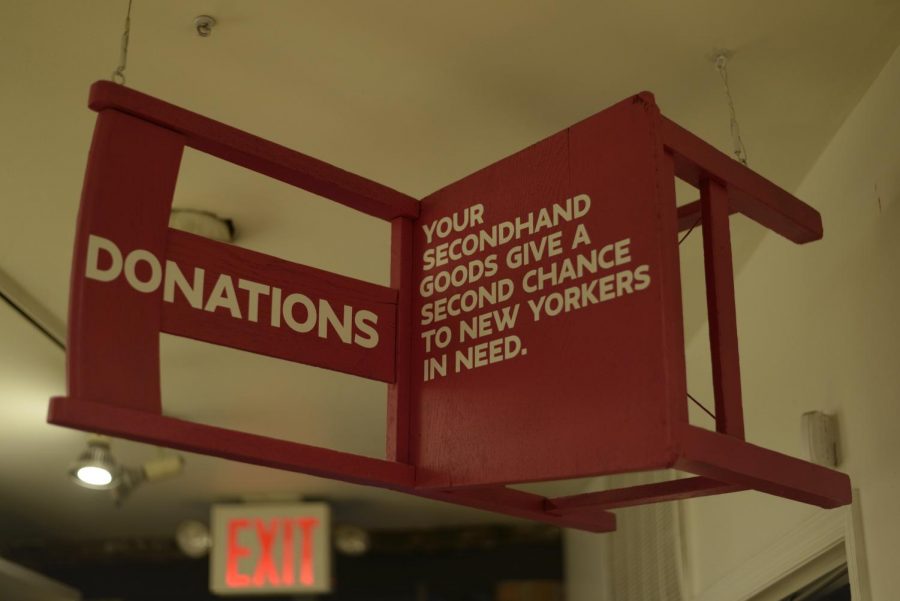Repackaging Christmas Gifts: Making Better Use of Things You Don’t Want
NIGEL ZWEIBROCK/THE OBSERVER
One way to make use out of holiday presents you don’t want is to donate them to local shelters.
January 21, 2019
We’ve all been there: it’s the holiday season, surrounded by friends and family, and the gift giving begins. You open up your present … but it’s far from anything that you could traditionally use or even find interesting. You smile politely and say “thanks,” immediately thinking that you will stuff it deep into the recesses of your closet and never see it again.
But why waste space with clutter when you could easily turn it into treasure? Just because a loved one picked a less-than-ideal gift for you doesn’t mean it can’t have good use.
For starters, you could easily just return it. Gift receipts are our friends; it may be a pain to get to the store, but the trek will be well worth it if you can exchange it for something you truly love and will use. Even if you don’t find anything that catches your eye right then and there, most stores will accept returned items and give you store credit — or, if you’re really lucky, a refund.
For those who received gifts without documentation to return them, there are still a plethora of alternatives. Just ask social work major Cat Fernando, Fordham College at Lincoln Center (FCLC) ’20. The student leader of sock donation service Socks in the City recommends several local donation sites that will give unwanted pieces good homes.
With several locations in Manhattan – including two on Ninth and Columbus Avenues – Housing Works Thrift Shop accepts just about anything, including clothes, furniture, jewelry/accessories, handbags, art, houseware and lighting items. For those with toiletries and casual and professional clothing, the Xavier Mission Clothing Room downtown on 15th St. is another great option.
“I volunteer at their shelter about twice a week so again, donations can be sent through me or dropped off directly,” Fernando said.
“Both Socks in the City and the Rauschenbusch Metro Ministry Winter Clothing Closet can take any winter gear — jackets, blankets, gloves, hats, scarves, etc.,” Fernando added. “I volunteer at Rauschenbusch every Saturday, so if students want to donate to them, they can either go directly or send donations through me!”
Another option is to host a swap party with friends who also have gifts they want to unload. Bring everyone together who has gifts they do not want and exchange them for items that catch their eye that other people are do not want. As the saying goes, “one man’s trash is another man’s treasure.” Your “bad present” will go to someone who finds value in it.
Alternatively, if you know a specific person who will love an item you were given, save it for a birthday or rainy day and give it to them. If it aligns with their tastes and will get more use in their possession, the bad rap regifting has can take on a much more meaningful one.
Jo Porco, FCLC ’20, agrees. “Regifting is a good option if it’s something you really can’t find use for,” Porco said. “The key is to repackage and be mindful of who gave it to you, how you can present it as part of a gift, etc.”
Those feeling particularly crafty can re-appropriate the gift to give it new purpose. That itchy sweater could be cut up to make cozy hot cup sleeves and potholders. An ugly mug can be repainted and used for storage. Get creative and consult Pinterest.
Of course, there is the increasingly popular turn toward online sales. Websites like Amazon and Ebay as well as apps like Depop and Poshmark allow users to sell goods to interested buyers. This method is not for everyone, especially those that hold an emotional connection to things given to them. But for those who hold no qualms with this tactic, getting some spending money from products they would never use is a solid option. Just be sure to ask for fair prices and factor in the cost of shipping on your end.
In the end, what you do with any material possession is up to you. To paraphrase the tidying queen Marie Kondo, your things should spark joy. And if that cutlery set your aunt gave you doesn’t bring you happiness, there is nothing wrong with letting it go.











